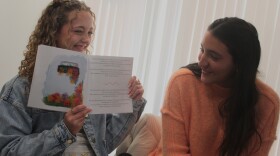The winter season is an important part of New Hampshire’s culture, but winters are getting warmer here as a result of climate change. Gabriel Andrus of Walpole is taking note. He is beginning a 300-mile cross-country ski expedition which he will document in a film about New Hampshire’s changing winters.
Andrus joined NHPR’s Morning Edition host Rick Ganley to discuss the documentary and expedition as part of NHPR’s climate reporting project, By Degrees. Below is a transcript of their conversation.
You can read more of our climate coverage here.
Transcript
Rick Ganley: So you're going to be skiing from the Canadian border to Walpole, [New Hampshire,] your hometown, as part of the filmmaking process. What inspired you to make this documentary and to take the trip?
Gabriel Andrus: Yeah, so the initial inspiration came from my grandfather. [It was] a particular image that I saw of him standing on this big snowdrift in a farm that he grew up on in Andover, New Hampshire. We were looking through an old photo album, and I saw this picture. I was like, 'Wow. I don't think I've ever seen a winter quite like that with that much snow.' And it started this conversation about wintertime in New Hampshire.
And there's always been open winters and there's always been variability in the New Hampshire wintertime, but a big thing that he talked about was just the consistency of snow being different and the timing of the seasons, like winter starting later and ending sooner. And being someone who loves the winter and has been privileged enough to spend a lot of time outside skiing and being in nature, I've grown a deep connection to it. And I really feel strongly about sharing the beauty of winter time with other people and understanding how winter has changed.
Rick Ganley: Now you're interviewing other locals and experts, too, about climate change here in New Hampshire for the film. What are some of the conversations that have struck you so far?
Gabriel Andrus: Yeah, so I talked to a [University of New Hampshire] researcher named Elizabeth Burakowski, and she's doing some really incredible research on climate trends, the rate that the Northeast is changing, and how the Northeast is positioned to see the most dramatic change in winter climate anywhere else in the United States.
Rick Ganley: [There are] so many implications from it.
Gabriel Andrus: [There are] personal and cultural impacts that it has for people: to look outside and see brown instead of white on Christmas or the economic impacts and people's own enjoyment. It's really far reaching because winter is so ingrained in New Hampshire and the culture here for so many people.
Rick Ganley: So tell us more about the trip itself. How is it going to work? What are you carrying? What are you bringing with you?
Gabriel Andrus: I was pretty concerned a few weeks ago. I thought I was going to be hiking a lot more than I was going to be skiing. The plan is to tow a sled with a little harness that I have to a hip belt. And so most of the trip, hopefully with snow depending, I'll be towing that sled behind me with my skis and just carrying my tent, my camera equipment, food, everything that I need in that sled.
And this winter has been a really good example of, as a lot of researchers are calling it, the 'new normal' that's going to happen in New Hampshire. And the plan is to do the trip no matter what happens, because that's the story: it's just winter as it is right now and the present day.
Rick Ganley: Are you prepared to hike it? Are you prepared to go through the mud in rain and freezing precipitation and all that that comes with it?
Gabriel Andrus: That can make it more dangerous, having rain and freezing temperatures. Rain can be a lot harder to manage hypothermia and the risks around that. So it definitely introduces more variables. But the plan is to go forward no matter what the conditions are.









